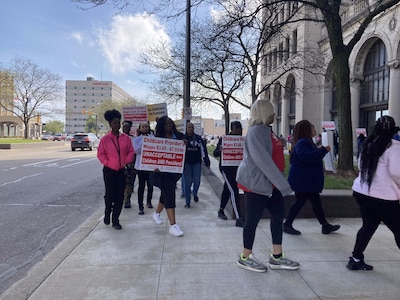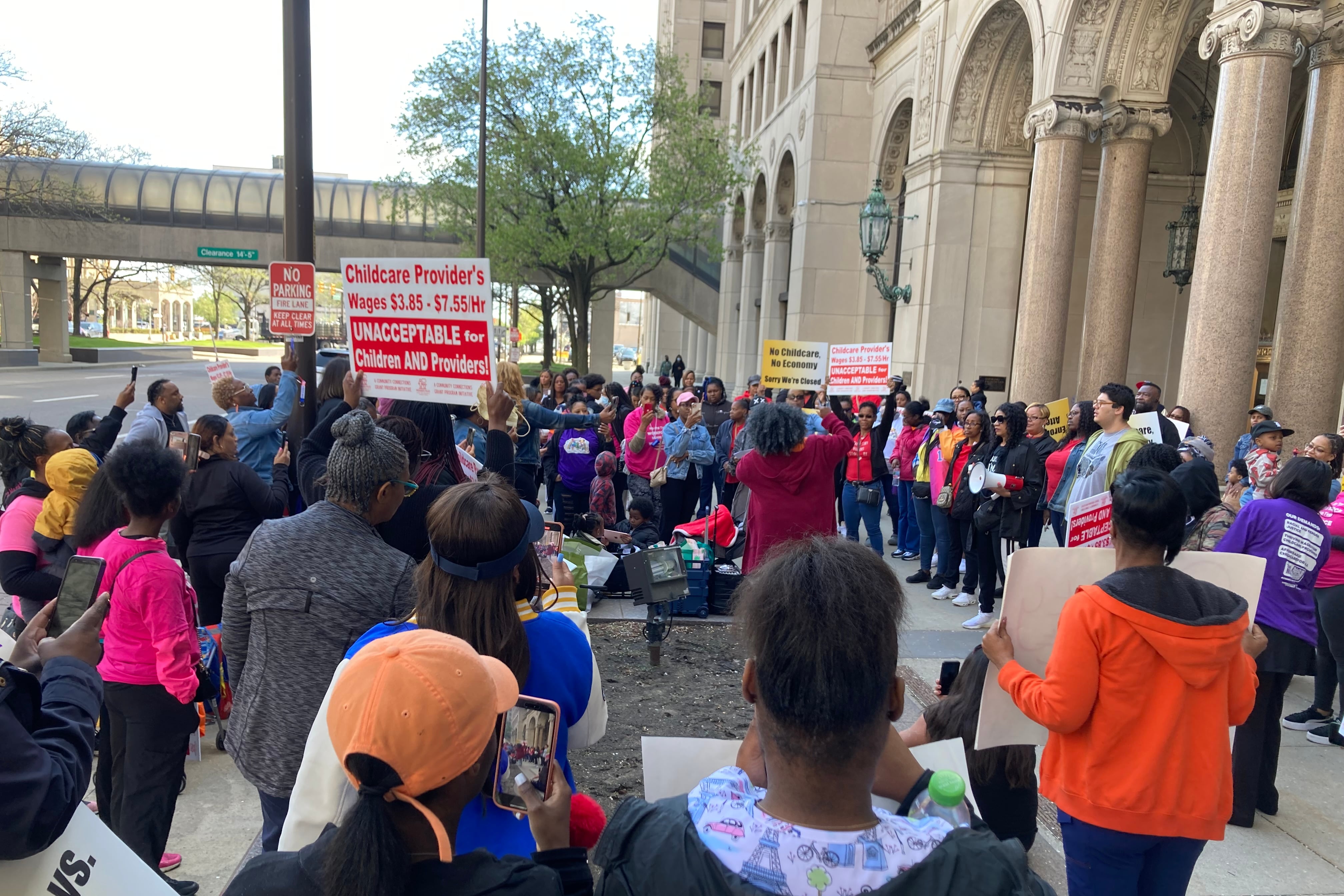Chalkbeat is a nonprofit news organization covering public education in communities across America. Sign up for Chalkbeat Detroit’s free daily newsletter to keep up with the city’s public school system and Michigan education policy.
The child care providers marched up and down Grand Boulevard in Detroit, chanting “No child care, no work” and other messages they hope will reach state officials with the power to address their demands.
“What do we want?” the woman with the megaphone asked the crowd.
“More money!” the crowd shouted.
“When do we want it? the leader asked.
“Now.”
The “Day Without Childcare Rally,” which took place outside the Cadillac Building, where Gov. Gretchen Whitmer has a Detroit office, was held with the hope that state officials would include even more money for child care than has already been proposed in budget negotiations.
More than 100 people showed up for the Detroit protest. Similar demonstrations were happening across the U.S.
The demonstrators — a mix of child care and preschool providers, educators, and parents — say they appreciate Whitmer’s efforts to invest more heavily in child care, but they say it’s not enough. Whitmer’s budget proposal includes a tax credit of $1,000 to $3,000 for early childhood educators who work in child care, preschool, and after-school settings.
Whitmer has also proposed expanding the Great Start Readiness Program, the state’s free preschool program that currently serves mostly children from low-income families. The expansion would give thousands more 4-year-olds access to the program.
Among the demonstrators’ demands is additional funding so they can pay workers a living wage and an end to the state’s rating system for child care programs that assigns a star rating based on quality.
The national effort is pushing for an equitable child care system, thriving wages for providers, and affordable child care for all families.

Protesters in Detroit say providers struggle to pay their staff and themselves a living wage.
“In this line of work, I have to get paid in hugs and kisses because my families can’t afford to pay me adequate money to sustain myself,” said Makese Taylor, a licensed child care provider who operates Twins Hands with her sister.
“It leaves me part of the working poor,” Taylor said.
Another common message: Michigan’s economy can’t recover from the pandemic if the state’s system for providing care for children while their parents are at work isn’t healthy.
“Without child care, the economy can’t go,” Hodge said. “We should never be an afterthought.”
Bobby Leddy, spokesman for Whitmer, said in a statement that the governor “is using every tool in her toolbox to lower the cost of child care for Michigan families and address decades of disinvestment in child care.”
Leddy said Whitmer has already worked with Republican lawmakers, who controlled the Legislature until this year, to make child care more affordable for working families, stabilize child care businesses, and expand access to child care. In addition, the state is three-quarters of the way toward meeting a Whitmer goal to open 1,000 new child care programs.
“As a mom, the governor knows how important it is for parents to know their kids are safe while they’re at work,” Leddy said.
Michigan’s child care system has struggled to provide quality care for parents who need it, and to recruit and retain staff. A 2022 Muckrock report found that Michigan has far more child care deserts — regions of the state with too few facilities to meet demand — than policymakers estimated.
Earlier this year, a Chalkbeat story noted that Whitmer’s proposal to expand the free preschool program would need to address staffing shortages. Low wages are at the heart of the staffing challenges.

Symone Wilkes, a single mother of two small boys, has experienced the child care desert problem firsthand. She said there are 16 providers in her neighborhood, but none had a slot available for her 1-year-old son. That meant having to travel well outside her neighborhood to find care, which has created its own set of challenges.
Wilkes came to the protest Monday because “our voices need to be heard” and so state officials understand the need for all families to have access to child care.
Many of the providers who participated in the protest shut down their facilities for the day, hoping that action would also send a message.
“We need them to hear us,” Taylor said.
Tichina Sanders, a child care teacher at Hodge’s facility, wants lawmakers to understand how essential her work is.
“We’re not just babysitters to kids,” said Sanders, who makes $13 an hour. “I’m helping them learn.”
Lori Higgins is the bureau chief for Chalkbeat Detroit. You can reach her at lhiggins@chalkbeat.org.







